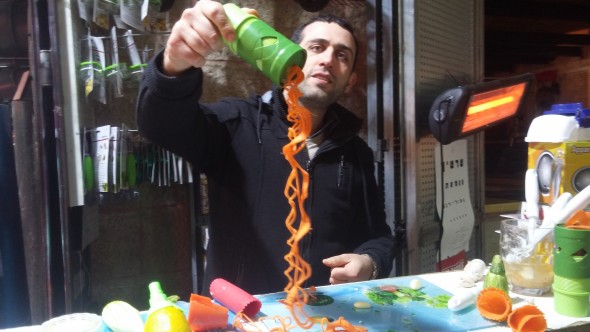10 Food Trends from Israel for 2016: Contributing editor and professional chef, Yehudah Jacobs, shares his top predictions for the food scene’s movement from East to West.
As the New Year comes around, so do the new trends in the culinary world. This past year we have seen kale become old news, Uber delivering food instead of just people, and a much larger focus on health-focused eating. The food scene in Israel has been setting the pace for worldwide food trends for some time, with such noteworthy achievements as Conde Nast Traveler naming the world’s best vegetarian fare as strictly Israeli and the best new restaurant in the entire USA being the product of a young Israeli chef, Timna.
Here are the top food trends from Israel that will change the western diet and palette in 2016:
1. Major emphasis on local produce. More and more families are moving to support their local businesses including food. Buying products mainly from Israel especially fresh produce is quintessential and helping a local out is seen as the ‘right’ thing to do in Israel. This mentality is slowly trickling into the mainstream American mindset, too, and is a total throwback to ‘love thy neighbor’ in the process of eating great foods.

2. The Anti-Pasta. We are looking at a year that pasta is not going to be the main carbohydrate on our plate. With kitchen tools like the spiral slicer, chefs and home cooks are making pasta out of vegetables like zucchini and carrots. Spiralizers aren’t just for Instagrammers and bloggers in Israel– they’re how real people get their children to eat real vegetables. If you’re wondering why the people of Israel are svelte, it’s the zucchini instead of pasta mentality.
3. Less gourmet restaurants, more casual dining. More Israeli chef are looking to move to the street food movement. In Tel Aviv, Chef Eyal Shani opened a casual jeans-and-sneakers place called Miznon that sells high end gourmet food. Many chefs are following in pursuit of making food simple and less sophisticated again, as it should be. Stuffy restaurants are a thing of the past– inviting, casual atmosphere is the new wave.
4. A focus on ethnic cuisine. 2016 is the year of Middle Eastern cuisine and Israel is presenting this in an east-meets-west way. Chefs around the world are shifting their flavors to the Middle East, looking for its different take on the same old ingredients. MasterChef winner Chef Avi Levy just opened a second restaurant in Tel Aviv, focusing on dishes based on the Algerian roots he grew up with. Americans are finally adding hummus to everything, too, and we can thank Israeli companies like Sabra for setting that trend.
5. More homemade food products. Let’s just start by saying that the roads in Israel aren’t crowded with Sysco trucks like they are in America. The American restaurant, on average, is loaded with flash-frozen proteins, nearly nutrient-stripped veggies, and preservative-filled premade junk. Why? Because it’s cheaper and easier to employ only lightly-trained staff to basically thaw and microwave food before slopping it down on your table. This isn’t the case in Israel, where food is art and every man, woman, and child considers himself either an artist or art expert. Food is also more expensive in Israel because of the small and delicate nature of the nation itself, so people hold their meals in much higher regard. There is no ‘I’ll meet you at Applebees after work’ mentality. It’s ‘come over and we’ll cook together’ or ‘I know a guy who just opened an artisan bakery, let’s meet there.’
6. More modern food markets. In Israel, every sizable city has had once an old run down market that sold everything. Food, appliances, falafel stands, fresh fish flopping around, half a cow on a hook and many more delicacies that cannot even be adequately described with English words. Not anymore. Today’s newer and modern markets are indoors and are very stylish, chic, Euro-feeling, and sell mainly boutique items: organic local produce, grass fed beef, intricately designed baked goods, and much more. The new Sarona Market is a good example of the way this movement is taking root.
7. More vegetables, less red meat. Thanks to the rising prices of and social awareness of attributed illnesses from red meat, we will be buying more vegetables. Not your run of the mill veggies but more root vegetables like fennel, sunchokes, turnips, and heirloom carrots. These vegetables have the ability to make great dishes when cooked in the slow cooker, roasted, sautéed or even grilled.
8. Ethnic condiments and spices. 2015 was the year of the sriracha sauce. This upcoming year will be the year of the amba,harissa, and tahini sauce. All local condiments that can be put on almost any type of food. Look in your local supermarket for one of these sauces. Also look for sumac, ras-el-hanout and za’atar. These spices are used a lot in the Israeli cuisine and will be taking over your spice rack this year.
9. What is Ras el Hanout? Get ready for it. Ras el Hanout is a delicious spice blend that originates from Morocco. It plays the same role as garam masala does in India. It’s made differently in every household but the fundamentals are always the same. It contains 12 spices like: cardamom, cumin, cloves, cinnamon, nutmeg, mace, allspice, dry ginger and many more. It is mixed mainly with proteins and has a very unique flavor. With a significant portion of the Israeli population hailing from old world Morocco (the Morocco that was essentially left behind right after World War ll), Ras el Hanout’s resurgence is thanks to the sephardic grandmothers sprinkled around Israel.
10. 2016 is going to be spicy. The hot pepper market is one of the fastest growing industries in the farming world right now. Every farmer worth his or her weight in peppers is trying to produce the hottest flavor on the market! Adding spice to your dish always adds another layer of flavor to any dish you eat, helps curb appetite, and can ‘fix’ otherwise ordinary or flavorless foods.











